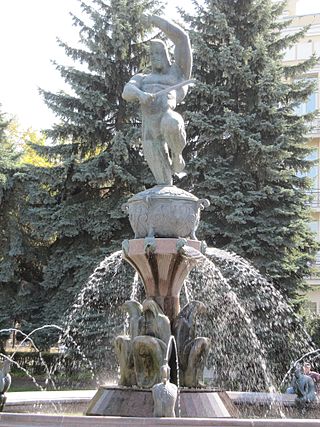Related Research Articles
The Nart sagas are a series of tales originating from the North Caucasus. They form much of the basic mythology of the ethnic groups in the area, including Abazin, Abkhaz, Circassian, Ossetian, Karachay-Balkar, and to some extent Chechen-Ingush folklore.
Georgian mythology refers to the mythology of pre-Christian Georgians, an indigenous Caucasian ethnic group native to Georgia and the South Caucasus. The mythology of the Kartvelian peoples is believed by many scholars to have formed part of the religions of the kingdoms of Diauehi, Colchis and Iberia.

Sosruko, Sosruquo, or Sosriqwa, Soslan is a central character in many cycles of the Nart sagas of the North Caucasus.

Uastyrdzhi is the name of Saint George in Ossetian folklore. Uastyrdzhi is the patron of the male sex and travellers as well as being a guarantor of oaths, like his Iranian counterpart Mithra with whom he shares a common origin. It is forbidden for women to pronounce his name; instead, they must refer to him as лӕгты дзуар lӕgty dzuar.
Batraz, Batradz, or Pataraz is a central character in the North Caucasian myths known as the Nart sagas. The Narts were the central figures of the folklore of peoples of the North Caucasus.
Apsat is a male deity of birds and animals in the mythology of the peoples of the Caucasus. His name may come from the Abkhaz language word a-psaatʷ, meaning "bird", or possibly from the name of the Christian saint with whom he was popularly associated, Saint Eustathios; it should also be noted that in Digor, Æfsæ means horse, and his name would thus be colloquially understood to mean "of horses". Some sources regard him as responsible for all hunted game, while others consider him to watch over fish and birds specifically. In some cycles, he is the primary hunting god, while in others, he is part of a pantheon of hunting deities. A few sources connect him with thunder and lightning.
Ossetian mythology or Alan mythology is the collective term for the beliefs and practices of the Ossetian people of the Caucasus region, which contains several gods and supernatural beings. The religion itself is believed to be of Scythian origin, but contains many later elements from Christianity, with Ossetian gods often being identified with Christian saints. The gods play a role in the famous stories about a race of semi-divine heroes called the Narts.
The Vainakh peoples of the North Caucasus were Islamised comparatively late, during the early modern period, and Amjad Jaimoukha (2005) proposes to reconstruct some of the elements of their pre-Islamic religion and mythology, including traces of ancestor worship and funerary cults. The Nakh peoples, like many other peoples of the North Caucasus such as Circassians, practised tree worship, and believed that trees were the abodes of spirits. Vainakh peoples developed many rituals to serve particular kinds of trees. The pear tree held a special place in the faith of Vainakhs.
Mythology of the Caucasus is the mythologies and folklore of the various peoples of the Caucasus region.

Soslan is an Ossetian male given name widespread among Ossetians in Russia.

Assianism is a polytheistic, ethnic and folk religion derived from the traditional narratives of the Ossetians, modern descendants of the Scythians of the Alan tribes, believed to be a continuation of the ancient Scythian religion. It started to be properly reorganized in a conscious way during the 1980s, as an ethnic religion among the Ossetians.
Donbettyr is the god of all waters, and the protector of fish and fishermen in Ossetian mythology. He is related to a Scythian deity of the same name. His name is possibly derived from don, meaning 'river', derived from danu, meaning 'to flow', as a prefix for the name Peter ("Bettyr"), possibly in reference to Saint Peter. He is the Ossetian equivalent of the Greek Poseidon.
Hory-Uacilla or Uacilla for short, is the name of Saint Elijah in Ossetian folklore.
Safa in Ossetian mythology God of the hearth chain. Identified with the deity of blacksmiths Kurdalægon.
Fælværa or Falvara in Ossetian mythology is the protector of sheep and cattle. He is identified with the deity of hunting Æfsati and has a rivalry with the deity of wolves, Tutyr.
Alardy is a spirit or god of the Ossetian mythology, who inflicts smallpox and measles on children.
Aminon a female creature and gatekeeper of the underworld in Ossetian mythology.
Akhsar and Akhsartag are twin brothers who are heroes in Ossetian mythology and sons of Warhag. Akhsartag is also the father of the narts Uryzmaeg and Haemyts.
Uryzmaeg is the hero of the Nart saga of the peoples of the Caucasus, son of Akhsartag and Dzerassae.
Haemyts or Khamits is the hero of the Nart saga of the peoples of the Caucasus, son of Akhsartag and Dzerassae, the father of the hero Batraz and the twin brother of Uruzmaeg, with whom they often went on conquest campaigns together.
References
- 1 2 Dumézil, Georges (2001). Ossetian saga and mythology. Vladikavkaz: Science. p. 21.
- 1 2 3 Meletinsky, Yeleazar (1990). Mythological Dictionary. Soviet Encyclopedia. p. 672.
- 1 2 3 Tokarev S. A. (1992). Myths of the peoples of the world. Vol. 2. Soviet Encyclopedia. p. 719.
- ↑ Bestaeva, Alina. "Тутыр в осетинской мифологии — Tutyr in Ossetian mythology". south-ossetia.info. Retrieved 2023-01-29.